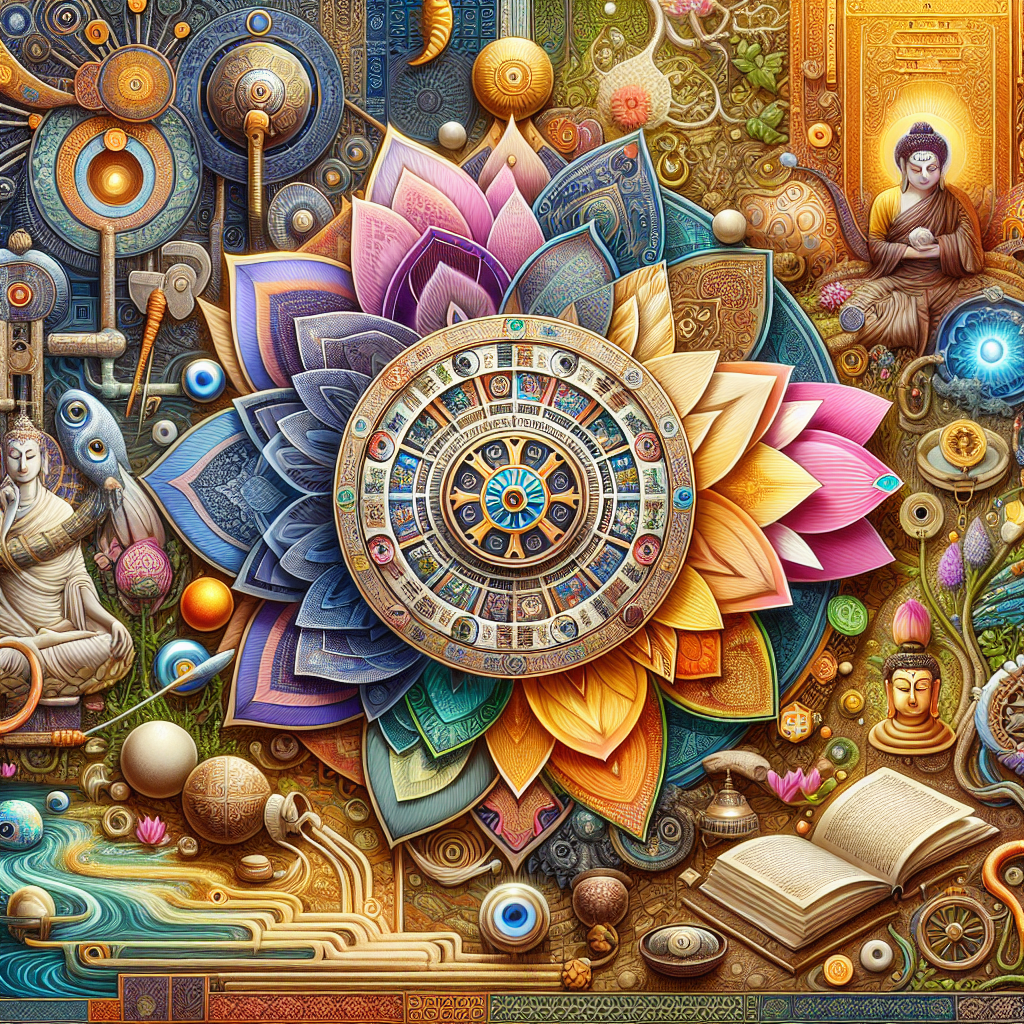Karma, a term derived from the ancient Indian language of Sanskrit, literally means "action" or "deed." Its philosophical implications, however, transcend mere actions; it embodies the concept of cause and effect in ethical and moral dimensions. Central to the belief systems of Hinduism, Buddhism, and Jainism, as well as influencing modern global spiritual practices, the notion of karma has evolved and adapted through centuries. This article explores how karma manifests across these cultures and its broader implications.
Karma in Hinduism
In Hinduism, karma is intricately woven into the fabric of the belief system. The foundational texts, such as the Vedas and the Upanishads, articulate a complex relationship between karma, dharma (righteous duty), and moksha (liberation). In this context, every action bears consequences that affect not only the present life but future incarnations as well. The cycle of birth, death, and rebirth, known as samsara, is governed by the accumulated karma from previous lives.
Two primary types of karma are distinguished in Hindu philosophy:
- Sanchita Karma: This is the accumulated karma from all past lives, the totality of actions that have not yet manifested in the current life.
- Prarabdha Karma: This portion of accumulated karma is ripe for experiencing in the present life. It determines the circumstances one faces, serving as a direct influence on one’s experiences, challenges, and opportunities.
Hindu texts also emphasize the importance of intention behind actions. Good karma arises from selfless actions aligned with dharma, promoting familial and societal welfare. Conversely, negative karma accumulates through harmful actions, selfishness, and disregard for collective well-being.
Karma in Buddhism
While Buddhism shares the concept of karma with Hinduism, it offers a distinct interpretation. The Buddha emphasized that karma refers not only to actions but also to the intentions behind those actions, encapsulated in the Pali phrase "Kamma." For Buddhists, karma is one of the critical factors that influence the cycle of samsara, but it serves a pivotal role in shaping one’s path toward enlightenment and nirvana.
In Buddhism, karma operates through the understanding of the Four Noble Truths and the Eightfold Path. Actions shaped by wholesome intentions lead to positive karmic outcomes, while unwholesome intentions generate negative karma. This moral accountability encourages practitioners to act mindfully and with compassion, as they cultivate "skillful" actions (kusala) that contribute to enlightenment.
Buddhist philosophy teaches that karma is not fixed or predestined; rather, it is fluid and dynamic. Individuals possess the agency to change their karma through mindful behavior. The concept of anatta, or "non-self," further elaborates on this notion, suggesting that the individual ego is an illusion and that actions accrue to the collective consciousness.
Karma in Jainism
Jainism offers another nuanced perspective on karma, viewing it as a subtle material substance that attaches to the soul during one’s actions. In Jain philosophy, every action, thought, or word creates karmic particles that can weigh down the soul, obscuring its divine nature. This notion is vastly different from the more abstract interpretations of karma in Hinduism and Buddhism.
Jains distinguish between different types of karma, categorized by their effects on the soul and environment. For instance, Ghatiya karma obstructs the soul from achieving liberation, while Aghatiya karma influences external circumstances but does not affect the self’s ultimate goal of liberation. As such, the pursuit of ahimsa (non-violence), truth, and penance is vital for Jains, as these practices aim to shed the accumulated karma and liberate the soul.
In Jainism, the ultimate goal is to attain moksha—final liberation from the cycle of rebirth—by purifying oneself through ethical conduct, self-control, and the practice of non-attachment. The emphasis on karma reinforces the concept that every individual holds the responsibility for their actions and their eventual consequences.
Karma Beyond Traditions: Global Influences
As globalization proceeds, the concept of karma finds resonance across different cultures and religions, often detaching itself from its original contexts. Concepts of karma have entered Western spirituality and popular culture, where they are often interpreted in a more simplified manner, usually as a cosmic balancing scale or a means of justice where good beings are rewarded, and wrongdoers face repercussions.
New Age thought adopts a loose version of karma, echoing its fundamental belief in moral accountability where individuals are urged to take responsibility for their actions. However, this interpretation often overlooks the complex philosophical frameworks intrinsic to the original traditions.
Karma and Modern Science
Interestingly, recent explorations in psychology, neuroscience, and ethics have drawn parallels between the principles underlying karma and the laws of cause and effect observed in the natural world. Behavioral sciences highlight how our actions shape our mental and emotional states, stimulating discourse on how intention and behavior can impact one’s psychological well-being.
Conclusion
Karma serves as a profound philosophical concept that transcends the boundaries of religion and culture. In Hinduism, Buddhism, and Jainism, it is a vital tenet that shapes ethical conduct and spiritual aspirations, underpinning the interconnections between actions and their consequences. As societies evolve and adapt, karma continues to influence contemporary thought patterns around accountability, morality, and spiritual growth, reminding us that our actions resonate far beyond ourselves.
FAQs
1. What is karma?
Karma is a Sanskrit term meaning "action" or "deed." It refers to the principle of cause and effect, where every action has consequences, often affecting future experiences and lives.
2. How does karma affect reincarnation in Hinduism?
In Hinduism, karma influences the cycle of samsara (birth, life, death, and rebirth). The actions and consequences from past lives determine one’s current circumstances and future reincarnations.
3. How is karma viewed in Buddhism?
Buddhism emphasizes intention behind actions as a crucial factor in karma. Positive intentions lead to positive outcomes, while unwholesome intentions generate negative karma, influencing one’s path towards enlightenment.
4. What role does karma play in Jainism?
In Jainism, karma is seen as a material substance that attaches to the soul based on one’s actions. The purification of the soul through ethical behavior and self-discipline is essential to liberate oneself from karmic bonds.
5. Can actions change karma?
Yes, both Buddhism and Hinduism highlight the capacity for individuals to alter their karma through mindful actions, intention, and ethical conduct, emphasizing personal agency in moral and spiritual development.
It seems like you might be looking for a prompt or topic to discuss! Here are a few options:
Creativity: Write a short story about a time traveler who accidentally arrives in a significant moment in history but cannot reveal their identity.
Technology: Discuss the implications of artificial intelligence in everyday life. What are the potential benefits and drawbacks?
Philosophy: Explore the question, "What does it mean to live a good life?" Consider different philosophical perspectives.
Environment: Write about innovative solutions to combat climate change and how individuals can get involved in these efforts.
- Personal Growth: Reflect on a challenge you’ve faced and what you learned from it. How did it shape who you are today?
Feel free to choose one or let me know if you have a specific topic in mind!
, #Karma #Cultures #Comparative #Study #Role #Hinduism #Buddhism, #Karma #Cultures #Comparative #Study #Role #Hinduism #Buddhism, 1735083931, karma-across-cultures-a-comparative-study-of-its-role-in-hinduism-buddhism-and-beyond





